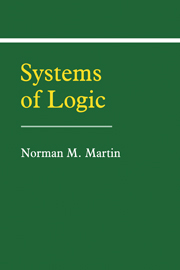Book contents
- Frontmatter
- Contents
- Preface
- 1 Formal Systems and Structure Theory
- 2 Zero-Order Logic: Proof Theory
- 3 Zero-Order Model Theory
- 4 Positive Implication
- 5 Negation
- 6 Complete Implication-Negation Logic
- 7 Disjunction
- 8 Conjunction
- 9 Multi-Connective Systems
- 10 Strict Implications: Introduction
- 11 Strict Implications: Additional Results
- 12 Quantification and First-Order Logic
- 13 Quantification and Complete Logics
- 14 Quantification and Incomplete Logics
- 15 Interpretation of Formal Systems
- Appendix: Historical and Bibliographical Remarks
- Subject Index
- Index of Systems
- Index of Symbols
- Frontmatter
- Contents
- Preface
- 1 Formal Systems and Structure Theory
- 2 Zero-Order Logic: Proof Theory
- 3 Zero-Order Model Theory
- 4 Positive Implication
- 5 Negation
- 6 Complete Implication-Negation Logic
- 7 Disjunction
- 8 Conjunction
- 9 Multi-Connective Systems
- 10 Strict Implications: Introduction
- 11 Strict Implications: Additional Results
- 12 Quantification and First-Order Logic
- 13 Quantification and Complete Logics
- 14 Quantification and Incomplete Logics
- 15 Interpretation of Formal Systems
- Appendix: Historical and Bibliographical Remarks
- Subject Index
- Index of Systems
- Index of Symbols
Summary
This book is a textbook on logic. It does, however, differ in a number of respects from the greater number of its sister textbooks with which the reader may be familiar, including, very probably, the one used in the reader's first course in logic. In the first place, it is not entitled “introduction to” or any of its total or partial synonyms, such as “elements,” “fundamentals,” or the like. While there are several reasons for this, the most important one is that it is not an introduction, but is written primarily with an eye to students who have already been introduced to the subject, presumably in the form of a college course in modern, or symbolic, logic (there is a sense in which it is nevertheless an introduction, but that would be hair-splitting). By and large, the main (and important) purpose of such courses, and consequently of texts appropriate to them, is to teach students how to use a certain technique, modern formal logic, in the evaluation of arguments and, while doing so, to introduce some of the concepts and theory of modern logic. In consequence, most of these books rightly devote a considerable portion of their material to, for instance, the problem of translating arguments from colloquial language into the formal system or systems used (in some cases, where the course or book is intended primarily for mathematicians, common mathematical language, which is often indeed more closely related to the formal systems, is the main object of comparison, instead of “natural” language).
Information
- Type
- Chapter
- Information
- Systems of Logic , pp. ix - xiiPublisher: Cambridge University PressPrint publication year: 1989
